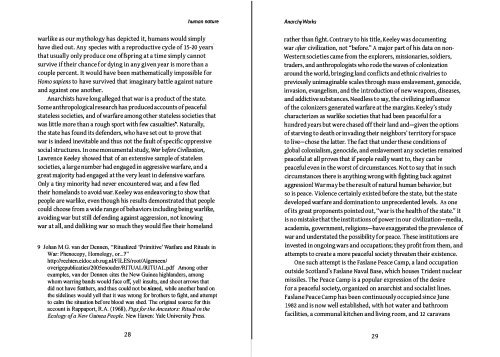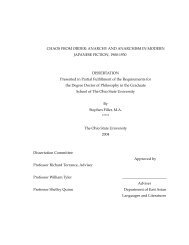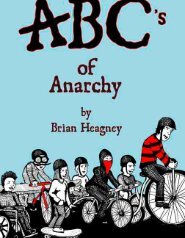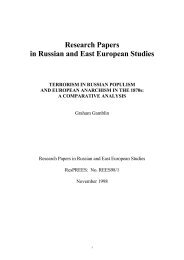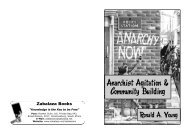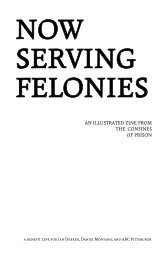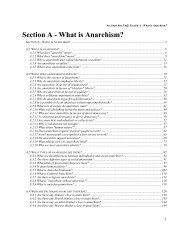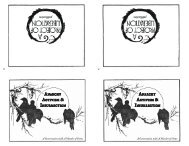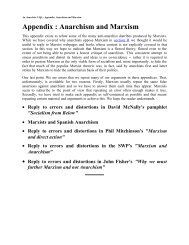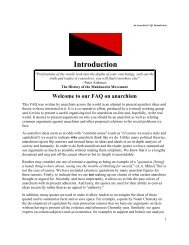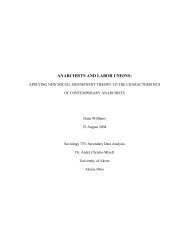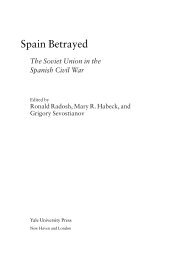Anarchy Works.pdf - Infoshop.org
Anarchy Works.pdf - Infoshop.org
Anarchy Works.pdf - Infoshop.org
You also want an ePaper? Increase the reach of your titles
YUMPU automatically turns print PDFs into web optimized ePapers that Google loves.
human nature<br />
<strong>Anarchy</strong> <strong>Works</strong><br />
warlike as our mythology has depicted it, humans would simply<br />
have died out. Any species with a reproductive cycle of 15-20 years<br />
that usually only produce one offspring at a time simply cannot<br />
survive if their chance for dying in any given year is more than a<br />
couple percent. It would have been mathematically impossible for<br />
Homo sapiens to have survived that imaginary battle against nature<br />
and against one another.<br />
Anarchists have long alleged that war is a product of the state.<br />
Some anthropological research has produced accounts of peaceful<br />
stateless societies, and of warfare among other stateless societies that<br />
was little more than a rough sport with few casualties9• Naturally,<br />
the state has found its defenders, who have set out to prove that<br />
war is indeed inevitable and thus not the fault of specific oppressive<br />
social structures. In one monumental study, War before Civilization,<br />
Lawrence Keeley showed that of an extensive sample of stateless<br />
societies, a large number had engaged in aggressive warfare, and a<br />
great majority had engaged at the very least in defensive warfare.<br />
Only a tiny minority had never encountered war, and a few fled<br />
their homelands to avoid war. Keeley was endeavoring to show that<br />
people are warlike, even though his results demonstrated that people<br />
could choose from a wide range of behaviors including being warlike,<br />
avoiding war but still defending against aggression, not knowing<br />
war at all, and disliking war so much they would flee their homeland<br />
9 Johan M.G. van def Dennen, "Ritualized 'Primitive' Warfare and Rituals in<br />
War: Phenocopy, Homology, or ... ?"<br />
http://rechten.eldoc.ub.rug.nIlFILES/root/ Algemeen/<br />
overigepublicaties/2005enouderlRITUALIRITUAL.<strong>pdf</strong> Among other<br />
examples, van der Dennen cites the New Guinea highlanders, among<br />
whom warring bands would face off; yell insults, and shoot arrows that<br />
did not have feathers, and thus could not be aimed, while another band on<br />
the sidelines would yell that it was "Tong for brothers to fight, and attempt<br />
to calm the situation before blood was shed. The original source for this<br />
account is Rappaport, R.A. (1968), Pigs/or the Ancestors: Ritual in the<br />
Ecology 0/a New Guinea People. New Haven: Yale University Press.<br />
rather than fight. Contrary to his title, Keeley was documenting<br />
war after civilization, not "before." A major part of his data on non<br />
Western societies came from the explorers, missionaries, soldiers,<br />
traders, and anthropologists who rode the waves of colonization<br />
around the world, bringing land conflicts and ethnic rivalries to<br />
previously unimaginable scales through mass enslavement, genocide,<br />
invasion, evangelism, and the introduction of new weapons, diseases,<br />
and addictive substances. Needless to say, the civilizing influence<br />
of the colonizers generated warfare at the margins. Keeley's study<br />
characterizes as warlike societies that had been peaceful for a<br />
hundred years but were chased off their land and-given the options<br />
of starving to death or invading their neighbors' territory for space<br />
to live-chose the latter. The fact that under these conditions of<br />
global colonialism, genocide, and enslavement any societies remained<br />
peaceful at all proves that if people really want to, they can be<br />
peaceful even in the worst of circumstances. Not to say that in such<br />
circumstances there is anything wrong with fighting back against<br />
aggressionl War may be the result of natural human behavior, but<br />
so is peace. Violence certainly existed before the state, but the state<br />
developed warfare and domination to unprecedented levels. As one<br />
of its great proponents pointed out, "war is the health of the state." It<br />
is no mistake that the institutions of power in our civilization-media,<br />
academia, government, religions-have exaggerated the prevalence of<br />
war and understated the possibility for peace. These institutions are<br />
invested in ongoing wars and occupations; they profit from them, and<br />
attempts to create a more peaceful society threaten their existence.<br />
One such attempt is the Faslane Peace Camp, a land occupation<br />
outside Scotland's Faslane Naval Base, which houses Trident nuclear<br />
missiles. The Peace Camp is a popular expression of the desire<br />
for a peaceful society, <strong>org</strong>anized on anarchist and socialist lines.<br />
Faslane Peace Camp has been continuously occupied since June<br />
1982 and is now well established, with hot water and bathroom<br />
facilities, a communal kitchen and living room, and 12 caravans<br />
28<br />
29


